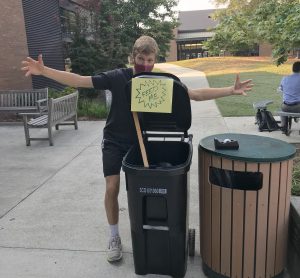
Since the dawn of time, the world has used and reused and reused and reused all of its resources from water, to nutrients, to air, and anything else you can name. The Law of Conservation of Mass still holds true in everything that we do today. Sustainability isn’t stopping some intergalactic cloud from exerting demonic and destructive influence on us, it’s about oiling the machine of deconstruction and reconstruction that is the earth and everything living on it instead of creating substances that will rust and get wedged between the gears. Plastic, styrofoam, and the production and disposal of such products that don’t decompose suffocate lives on earth—both literally and figuratively—that are the key to the cycle of renewal. If we do not maintain our planet and act now, our planet will not be the homeostatic oasis floating in space that it has been for billions of years.
We each take our role in preventing this future, and Durham Academy’s role is found in a group of students and teachers called the Upper School Sustainability Committee. The ways in which the DA Sustainability Committee combats waste and pollution are diverse and plentiful. One that I myself find very interesting is composting.
Composting is one of the most important ways we return vital resources to the earth. The most basic way we interact in the cycle of energy that exists on the earth is by eating.
Consuming food gives us energy to move, think, play, grow and live! But what happens to those scraps of food jam packed with nutrients that we just can’t consume?
Composting not only diverts this food waste from landfills, but it returns nutrients and microorganisms back to the plants that feed us, making them more nutritious, and even tastier in some cases!
Last year, due to the hybrid schedule, we collected less compost than we did previously. This year, however, compost collection has already increased drastically and we have multiple initiatives to increase the awareness of composting and make it easier than ever to minimize waste for our school.
Some of our goals as a community are to continue to optimize our sustainability strategy to our ever changing situation of new people and unexpected events in addition to making the impact of these actions known. We have created a campus map to make it easy for students and teachers to find compost bins and are making signs to make sure everyone knows everything that can be composted. Soon we will follow the example set by the middle school and facilitate composting paper towels from the bathroom and hold multiple learning opportunities for the whole upper school and beyond.
Last spring, I had the opportunity to interview Ms. Hock about her support of the DA composting program over the last 3 years. I asked her about the origins of the program and her hopes for it.
Though our actions seem small, a community that is aware and active in the practice of sustainability can spread the knowledge of its importance. Hopefully our efforts will lead to exponentially more impact than just our community which in turn could turn the tide on the earth’s waste problem. We hope that each person will choose to adopt sustainable practices and we are striving to make this a reality. We are not alone in this movement; many others have adapted their lifestyles to be more sustainable and convinced others to do so as well. Together, we can free the gears, scrub the axles, and oil the machine that gives us life.

Recent Comments